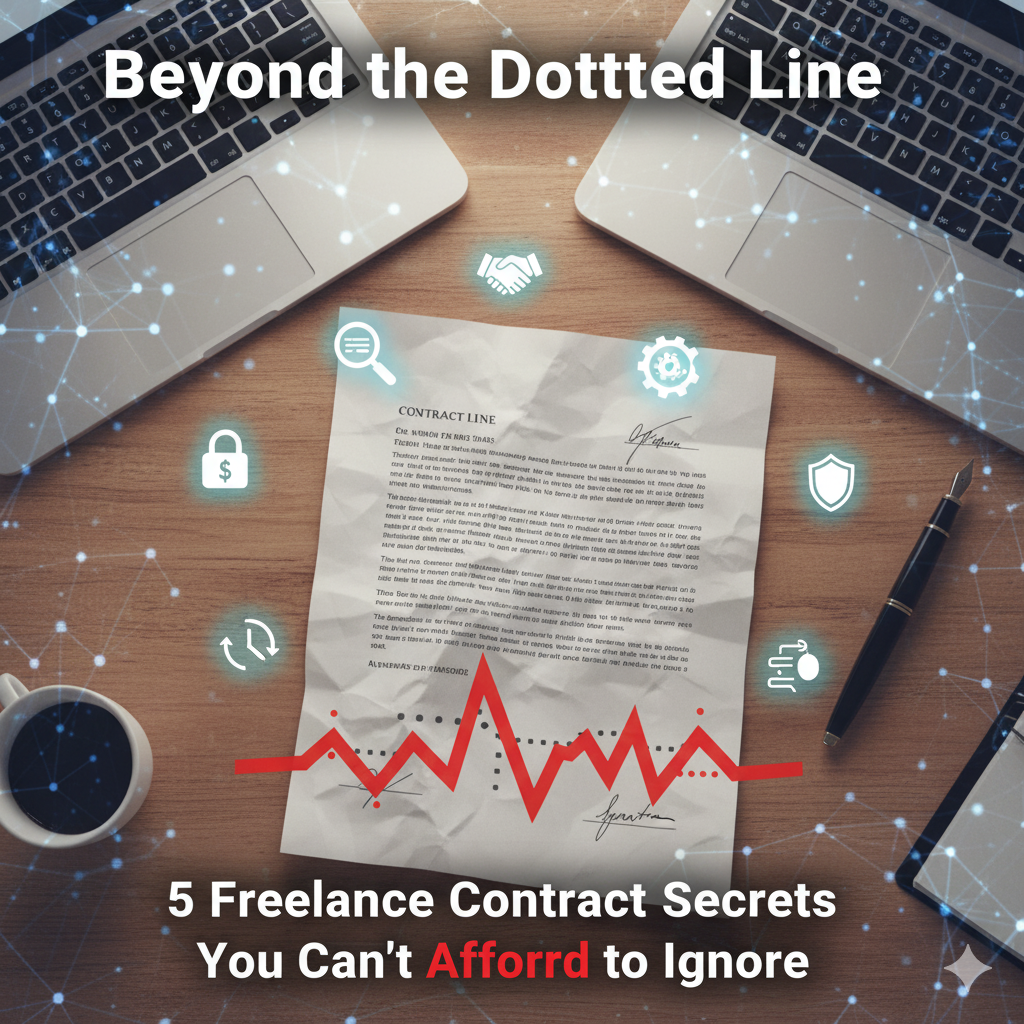Listen to this post: Beyond the Dotted Line: 5 Freelance Contract Secrets You Can’t Afford to Ignore
Let’s be honest: for most freelancers, contracts are a necessary evil. They can feel boring, intimidating, and filled with dense legal jargon. But a well-understood contract is more than just a formality; it’s one of the most powerful tools you have for professional protection and building a sustainable business. The problem is, the real power—and the real danger—often lies in the hidden details that many freelancers overlook.
This article pulls back the curtain on five often-ignored but critically important contract concepts. View them not as isolated tips, but as the interconnected pillars of a single strategy: establishing professional authority. By mastering how you control the work, the money, and the relationship itself, you can save yourself from major headaches, financial loss, and career-damaging situations.
1. That “Indemnity” Clause is Scarier Than You Think
Most freelancers assume they are only liable for their own mistakes—a standard part of being an independent contractor. If you plagiarize something or commit copyright infringement, you’re responsible. That seems fair.
But an indemnity clause can be far more dangerous. This clause often makes the freelancer responsible for the client’s legal costs and losses if the client gets sued in connection with the freelancer’s work. The most alarming part? This can apply even if you have done absolutely nothing wrong.
This isn’t about covering your own negligence, which is expected. This is about being forced to underwrite the client’s legal risks, a position no solo professional should accept. As one legal commentator on a professional forum explained this danger perfectly:
An indemnity clause is much worse than that. It says that if the client is sued in connection with your work, you are responsible for THEIR costs and losses. Under the terms of most indemnity clauses, it makes absolutely no difference whether you have actually done anything wrong.
Never sign a contract with a broad indemnity clause. Be wary of vague language like "Contractor shall indemnify and hold Client harmless from any loss or liability arising from performing services under this Agreement." If you see a clause like this, it’s a major red flag that warrants seeking legal advice.
2. “Scope Creep” Isn’t Just Annoying—It’s a Billable Event
Every freelancer knows the feeling: the client asks for one “tiny tweak” that snowballs into hours of unpaid work. This is “scope creep”—the all-too-common problem where a client keeps adding tasks and requests beyond the original agreement, often without adjusting pay or deadlines.
Instead of viewing scope creep as an unavoidable frustration, a strategic freelancer reframes this as a formal, billable event. The key is to manage it proactively within your contract.
Include a specific “Extra Work” or “Revisions” clause. Your clause must explicitly define what constitutes “extra work”—such as additional rounds of revisions, new feature requests, or stakeholder meetings beyond the initial two—and specify that it will be billed at your standard hourly rate. This simple clause is incredibly empowering. It transforms a potentially awkward conversation about more money into a simple, professional reference back to the terms you both already signed. This isn’t about being difficult; it’s about valuing your time and demonstrating that your services have a clear, quantifiable cost.
3. You Can—and Should—Charge Interest on Late Payments
Chasing down late payments is one of the biggest sources of stress and instability for freelancers. It disrupts cash flow and, according to a Forbes article, not getting paid on time is a top deal-breaker for 51% of freelancers.
The solution is to include a clear late payment clause in your contract. This isn’t just a threat; it’s a legally enforceable business practice. In the UK, for instance, you can legally charge statutory interest, which is 8% plus the Bank of England base rate. A common recommendation for freelancers globally is to charge a late fee of 1.5% per month on overdue invoices.
For maximum leverage, the SolidGigs source recommends a “work stoppage clause.” This powerful tool gives you the contractual right to pause all work if an invoice is overdue, instantly turning a payment issue into an operational priority for the client.
4. The “Termination for Convenience” Clause Is Your No-Fault Escape Hatch
Many freelancers believe a contract can only be ended if one party seriously violates the terms—a termination “for fault.” But what happens when a project is just a bad fit, the client is difficult, or your business priorities change?
This is where a “termination for convenience” clause comes in. This clause allows either you or the client to end the contract at any time, for any reason, without having to prove that a breach occurred. For a freelancer, this provides a professional, no-fault escape hatch from a project that is no longer working, allowing you to move on without burning bridges or getting into a messy dispute. While essential, note that this clause is more common in ongoing retainers. For fixed-term projects, early termination is often tied more directly to a “for fault” breach, making it crucial to negotiate this “no-fault” escape hatch upfront.
To protect both parties, this clause should include a reasonable notice period, such as 4 weeks, to allow for a smooth handover. It should also state clearly that you will be paid for all work completed up to the date of termination.
5. That “Non-Compete” Clause Might Be Illegally Restricting Your Career
A non-compete clause is designed to prevent a freelancer from working with a client’s competitors for a specific period after the contract ends. While this can be reasonable in some cases, overly broad non-compete clauses can severely and unfairly limit your ability to earn a living, conflicting with the legal principle of “Restraint of trade.”
For example, a clause that restricts a designer who specializes in marketing agencies from working with any other marketing agency for 12 months is unreasonable and likely unenforceable.
Don’t be afraid to push back. If a non-compete clause is too restrictive, ask the client to amend it or remove it entirely. It’s worth noting that the UK government is considering a 3-month cap on non-competes, which can serve as a useful benchmark for what is considered “reasonable.” Use this as leverage in your negotiations. Propose a 3-month limit yourself, showing you understand industry standards while respecting their need for reasonable protection.
Conclusion: Your Contract, Your Rules
A well-crafted contract is a freelancer’s best defense, a roadmap for the project, and the mark of a true professional. It’s not a document to be feared, but a tool to be mastered. Understanding these key clauses puts you in a position of power, allowing you to protect your business and negotiate terms that are fair and beneficial. A contract isn’t a barrier to overcome; it’s the blueprint you design for a successful engagement. Master these clauses, and you stop being a service provider and start being a business partner.
Now that you know these secrets, what’s the first change you’ll make to your freelance contract?













